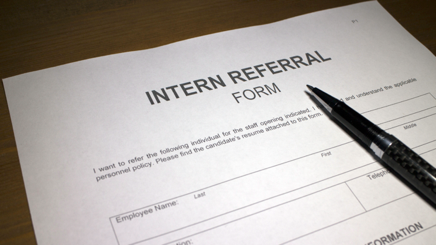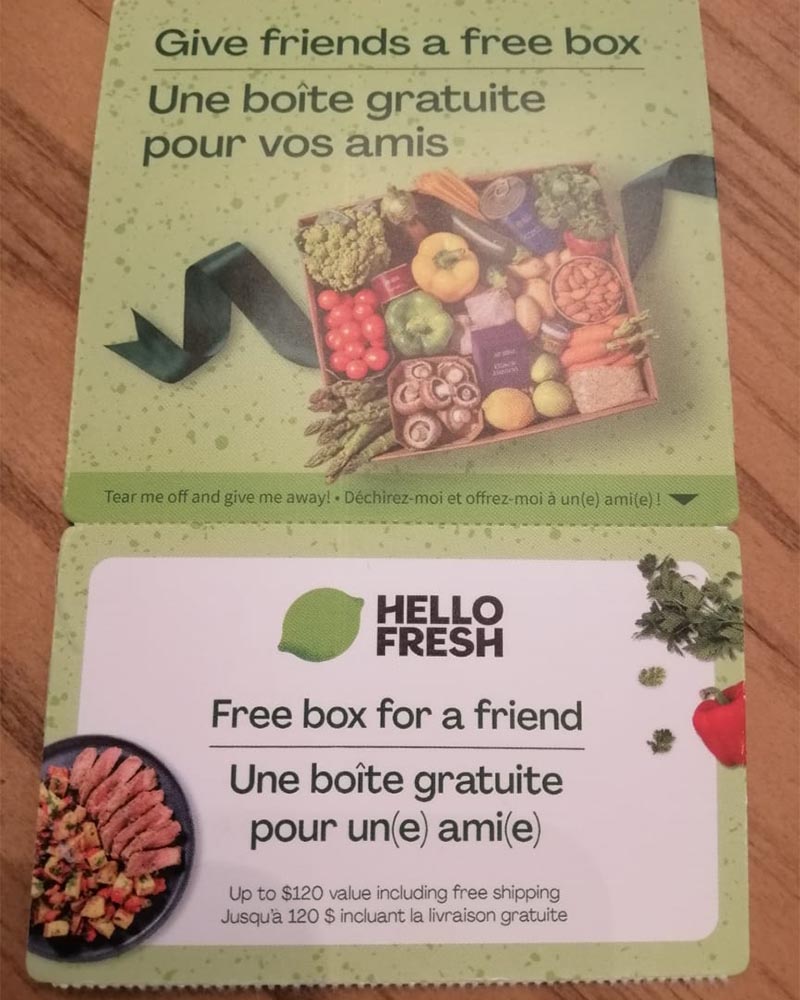Put your growth on autopilot
GrowSurf is modern referral program software that helps product and marketing teams launch an in-product customer referral program in days, not weeks. Start your free trial today.
One of the easiest ways businesses can generate word-of-mouth marketing is by incorporating referral cards at checkout or during events. Referral cards are printed cards, digital cards, or flyers that companies hand out to customers, usually with an incentive attached, to pass on to friends and family. According to a study by Gartner, businesses that implement referral marketing programs generate 28% higher value from referred customers compared to non-referred customers. Referral cards help facilitate this by making it easy for happy customers to share a brand with their network.
A successful referral will usually generate a reward for the participants, such as a discount, gift, or cash incentive. According to a survey by Referral Candy, cash incentives are the most popular type of referral reward, preferred by 34% of consumers. Still, there are plenty of excellent referral card ideas out there that won't cost an arm and a leg, like offering free products, service upgrades, or charitable donations.
Referral cards are a great low-cost entry to referral marketing for digital and traditional businesses alike. They are particularly well-suited for local businesses, as 83% of consumers are willing to refer after a positive experience at restaurants, salons, or other neighborhood establishments according to BrightLocal. By making referral cards readily available, these types of businesses can effectively tap into their customers' personal networks.
Word-of-mouth recommendations may seem out of place in a world focused on the latest and greatest digital marketing tools and tricks, but they can be incredibly beneficial. In fact, according to a study by Semrush, word-of-mouth marketing generates more than twice the sales of paid advertising, and those customers have a 37% higher retention rate. By facilitating authentic recommendations from trusted sources, referral cards help businesses tap into this powerful marketing channel.
Suppose your goal is to build trust, increase brand loyalty or improve brand discovery among your target market. In that case, you may need word-of-mouth marketing more than you realize. A study by Ogilvy found that 74% of consumers identify word-of-mouth as a key influencer in their purchasing decisions. Referral cards provide a simple way to facilitate those influential peer recommendations that drive sales.

In fact, by taking your existing customers and turning them into brand advocates, you are essentially creating hundreds of compelling marketers for your business.
Of course, the most significant benefit is that they already know dozens of people likely to enjoy your products and services (who says you need social media to go viral?). According to research by Jack Morton Worldwide, 83% of Americans say recommendations from friends and family members influence their purchase decisions. Referral cards enable businesses to leverage those influential personal connections in a scalable way.
Referral cards (also known as refer-a-friend business cards or customer referral cards) are a cheap, quick, and easy way to spread the word about your business. According to a case study by Referral Rock, businesses using referral cards saw an average 87% increase in referral leads. Some of the many incredible benefits of using referral (or refer-a-friend) cards include:
Sign up for a free trial of GrowSurf to lower your customer acquisition costs, increase customer loyalty, and save gobs of time.

Now that you are sold on the idea and ready to launch your referral program, let’s dig into a few referral card examples.
If you have a business, the chances are that you are super organized and that you’ve already had a few business cards printed up. Why not turn these nifty little contact cards into powerful referral marketing tools?

You can add an incentive to each card that you hand out. People are more likely to grab a card if it has some monetary value, and they are less likely to throw it away. Why? Because according to research by the Incentive Research Foundation, incentive rewards increase referral performance by up to 44%. An enticing offer grabs attention and motivates people to participate.
Because your card does not only have your contact information printed on it, but it also contains a small gift or incentive (who doesn't like free stuff?). Research by Vouchercloud found that 97% of people look for deals when making a purchase, so an incentive can be very persuasive. The key is making the offer valuable and relevant to your target customer.
Giving a physical cue to a customer also means they are more likely to remember you – and it makes it easy for them to pass it on to a friend. According to research by Baylor University, physical marketing materials like referral cards are better remembered than digital ads by 67% of consumers. The tangible nature helps reinforce brand recall.
Your card can include a simple link to a referral website or hotline, or it can serve as a redeemable gift card (e.g., "Show this card at the door and get a free dessert with your meal"). Research by Cogo Interactive found that 58% of consumers are more likely to make a purchase after receiving a printed coupon or referral card. Making the offer easily redeemable drives conversions.
As a business owner, you get a free network with every employee you hire! Encourage or incentivize your employees to share their in-depth knowledge about the company with others when recruiting new customers or staff. According to research by EmployeeReferrals.com, referred employees tend to be 25% more profitable and stay longer than job board hires. Providing referral cards makes it easy for employees to tap their networks.
Many companies use referrals when headhunting, offering a cash bonus when you hire a referred candidate. Why not use it as a sales tactic? Offer employees a signing bonus if a client they refer signs on with your business. According to research by the American Marketing Association, employee referrals convert 30% better than leads from other sources. Referral cards incentivize this high-converting channel.

Postcards are a great way to get your message out there. They are attractive, affordable and it’s pretty easy to add a personal touch to each one.
To make the postcards more personal, encourage your customers to write handwritten postcards to the people they are referring.
If you are feeling generous, you can even cover the postage costs so that they can mail them to their prospects.


Newsletters might sound a bit old-school, but they can be a highly effective form of communication. You can keep in touch with existing clients and provide valuable content that leads to extra sales. Use newsletters to encourage your customers to make constant referrals (you might be surprised by how eager a customer can be to spread the word!). And, of course, you should aim to make your newsletter informative and entertaining enough for your recipients to hit that forward button!

Everyone loves to rally behind a cause. You can inspire customers to refer their friends and family by donating to a community cause or charity that’s close to your heart, like disaster relief or a conservation project. It has the added benefit of generating goodwill towards your business – customers love companies that care!

6. Partner Referral Cards
As a business, you work with dozens of vendors and suppliers that probably have similar clients to your target market. Why not ask them for referrals? After all, if you are doing more business, they will too! You could include a link to referral programs on your email signatures, invoices, and receipts to keep it top of mind.

Now that you’ve got the basics and you’re overflowing with fantastic referral card ideas, it’s vital to establish the fundamentals of an effective referral card design.
Before you do anything else, you need to establish a suitable template for your referral program.
No matter the design of your referral card or the method you use, you must collect enough customer information. This will help close the sales loop and maximize the value of the leads you’ve generated.
Each referral card has to collect at least three key elements:
Business Info: This includes the name, address, and contact information (email, phone number) of the referred person.
Referral Info:Such as the person making the referral and the referred person. A qualifying reason for referring them is always a great piece of information to have, e.g., “I’m recommending Joe because he is in the market for a new car.”
Referral Program Info: You should clearly state the incentives associated with the referral, as well as any terms and conditions or limitations. For example, if you are the proud owner of a frozen yogurt store and offer a free soft serve to anyone presenting a completed referral card, you should limit it to one per customer!
The physical design of your referral card matters — opt for an eye-catching font, shape, and colors. Print them and display them in places where they will get noticed the most.
You might also consider adding posters or point of sale materials to your reception or checkout area to drive the point home.
We’ve already alluded to a few incentives you can add to your referral programs, such as donations, freebies, bonuses, and discounts. Choosing the best incentive for your referral programcan be daunting, but there are a few tricks of the trade you can apply.
Let’s face it! Who is not a big fan of discounts? They are extremely popular with clients – and they benefit your business too!
Existing clients will seize the opportunity to receive their favorite wish list item at a reduced price, and new customers will have a great excuse to visit your store or website, which can ultimately help you boost sales.
Discounts work well for items with a shorter lifespan, such as clothing, meals, or anything service-based. Still, they don’t work well for things like furniture that will remain in use for years.
It’s safe to say everyone loves cash. Still, you probably don’t want the headache of paying $20 to every customer making a referral. Online baby shop Pupsik offers points instead of cash payouts for referrals.
The points can be used for freebies and discounts when you’re shopping on the site. If you refer a friend, you receive 250 points when they make their first purchase, and they also get 100 points.
Cash works like a charm for companies that earn more from a referral than the average retailer. Real estate agents, second-hand car dealers, and insurance brokers are more than happy to fork out hefty cash referral fees because they will generate a lot of profit as a result.
Incentivizing your customers with store credit has similar benefits to discounts. The popular online sneaker shop GREATS gives each referring customer and the person they refer a $10 credit when they make a purchase with a unique link. They are actively targeting millennials, altruistic by nature, so giving credit to both parties has natural appeal.
Store credit works well if you are a pay-per-use company, which is why Uber, UberEATS, and Airbnb promote opportunities for their customers to earn credit in most of their marketing communications.
Needless to say that freebies are a great way to generate referrals! Many direct marketing companies (including Avon and Tupperware) send gifts to referred clients. The key is to pick an item that clients would use often and will also appreciate a lot. In addition to bringing in new clients, branded swag can serve as a visual reminder of your business.
One of the best ways to get referrals is, of course, by offering access to unique (and impossible to get into) events. Tesla gives clients who refer more than ten customers exclusive access to their (star-studded) launch events.
If your company operates on a subscription basis, you could build free subscription credits into your referral program. Amazon Prime quickly acquired 150 million subscribers by offering referral credit.
Swag comes in many forms, like free product boxes in subscription-based companies like Blue Apron or HelloFresh.

You are almost set! You’ve got your template, your unmissable design, and your incentive. Now you need to execute your campaign. Here are some of the best practices to apply when you launch your referral card program.
There’s no harm in asking your clients or vendors for referrals! If you’ve provided excellent service, most of them will be happy to refer people to you. Still, they won’t know that you are actively looking for business unless you tell them.
Tell all of your client-facing employees to highlight the referral program at the appropriate time (e.g., checkout).
It seems simple, but showing your deep appreciation to your referrers can go a long way! Send a short message of thanks, a gift card, a photo of their friend enjoying their incentive, or a shout-out on social media. It will encourage your referrers to keep referring and inspire others to do the same!
The companies that enjoy the best uptake of their referrals create many recommendation opportunities at every point of the customer journey.
Dedicate space to referrals on your website, build it into your checkout process, equip your sales staff with flyers and refer-a-friend business cards.
Whatever you do, make sure that every interaction with a client becomes a referral opportunity.
It’s important to remember that any referral has exponential value. Airbnb generated tens of thousands of bookings when a single influencer with two million followers tweeted their referral link. You never know how far your referral card can go!
In this article, we’ve explored:
Now that you have all the tips and tricks of the trade at your disposal, you can launch your campaign. Referral cards are a cost-effective and easy way to generate the buzz (and trust) you need via word-of-mouth marketing.
Start small, start simple, but most importantly – start as soon as possible. Every client that leaves the business without a referral card represents a missed opportunity.
Sign up for a free trial of GrowSurf to lower your customer acquisition costs, increase customer loyalty, and save gobs of time.


GrowSurf is modern referral program software that helps product and marketing teams launch an in-product customer referral program in days, not weeks. Start your free trial today.
Word of mouth marketing can be the strategy that skyrockets your business and takes it to another level. Here we tell you all you need to know about it.
Running a referral program can get complex. Luckily, it becomes easier to manage with a plan - and even easier if you have a referral program template to copy!
Learn why and how to choose an incentive for your referral program. Discover the best referral program incentives that will turn visitors into customers!